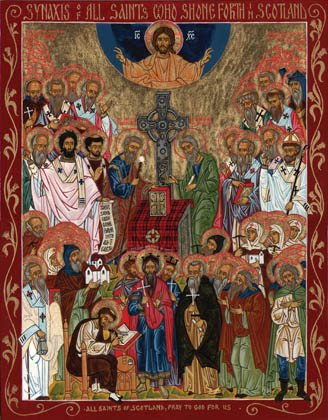Wednesday, 4 January 2012
The Holy Protomartyr Alban (†304)
first approach to the indigenous Orthodox Saints and Martyrs of the Ancient Church who lived and who propagated the Faith in the British Isles and Ireland during the first millennium of Christianity and prior to the Great Schism is being attempted in our website in our desire to inform our readers, who may not be aware of the history, the labours or the martyrdom of this host of Orthodox Saints of the original One, Holy, Catholic and Apostolic Church of our Lord.
"The Church in The British Isles will only begin to grow when she begins to venerate her own Saints" (Saint Arsenios of Paros †1877)
SAINT ALBAN was the first martyr in the British Isles; he was put to death at Verulamium (now called Saint Albans after him), perhaps during the persecution under the emperor Diocletian in the year 303 or 304, although some say that he gave his life in the reign of the emperor Septimus Severus, around 209.
According to the story told by St Bede the Venerable, St Alban sheltered in his house a priest who was fleeing from his persecutors. He was so impressed by the goodness of his guest that he eagerly received his teaching and received Baptism. In a few days it was known that the priest lay concealed in St Alban’s house, and soldiers were sent to seize him. Thereupon the St Alban put on the priest's clothes and gave himself up in his stead to be tried.
The judge asked St Alban, ‘Of what family are you?’
The saint answered, ‘That is a matter of no concern to you. I would have you know that I am a Christian.’
The judge persisted, and the saint said, ‘I was called Alban by my parents, and I worship the living and true God, the creator of all things.’
Then the judge said, ‘If you wish to enjoy eternal life, sacrifice to the great gods at once!’
The saint replied, ‘You sacrifice to demons, who can bring no help or answer to the desires of the heart. The reward of such sacrifices is the endless punishment of Hell.’
The judge was angered at the priest’s escape and threatened the saint with death if he persisted in forsaking the gods of Rome. He replied firmly that he was a Christian, and would not burn incense to the pagan gods. He was condemned to be beaten and then beheaded.
As he was led to the place of execution (the hill on which Saint Albans abbey church now stands) it is said that, by the martyr’s prayers, the crowd who accompanied him to his place of execution were enabled to cross the river Coln dry-shod. This miracle so touched the heart of the executioner that he flung down his sword, threw himself at St Alban's feet, avowing himself a Christian, and begged to suffer either for him or with him. Another soldier picked up the sword, and in the words of Bede, ‘the valiant martyr's head was stricken off, and he received the crown of life which God has promised to those who love Him.’
A spring of water gushed forth from the place of the martyr’s execution, and it is said that, at the moment at which the saint’s head fell to the ground, the eyes of his executioner fell out of their sockets. Before this spectacle, the governor ordered that the persecution of Christians cease, and that due honour be paid to the glorious martyrs of Christ. From that time, many sick people found healing through the numerous miracles wrought at St Alban’s tomb, and his veneration spread throughout England and also in Europe.
The shrine of St Alban had lain empty since the destruction of the English monasteries by King Henry VIII, but in 2002 a portion of the martyr’s relics was taken there from the church of St Panteleimon in Cologne, Germany, where they had been preserved for many centuries. These relics now lie once more at the place of the saint’s martyrdom.
http://www.oodegr.com/english/biographies/arxaioi/Protomartyr_Alban.htm
Subscribe to:
Post Comments (Atom)


No comments:
Post a Comment